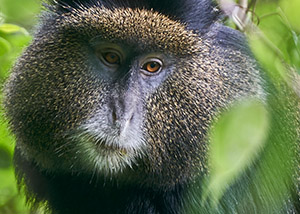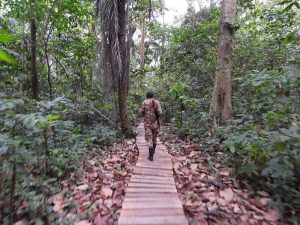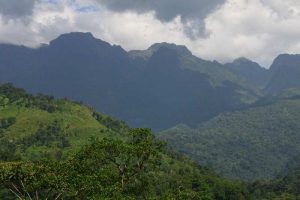Mgahinga National Park
Mgahinga National Park is the smallest national park in Uganda covering an area of 34 square kilometers. As you approach from the east the huge cones of volcanoes start to dominate the landscape. The region surrounding the park is primarily inhabited by Bafumbira and a small population of Batwa peoples. The park is part of the great Virunga conservation area covering the northern slopes of three volcanoes, namely, Mt Muhavura 4,127 metres, Mt Sabinyo 3’645 metres and Mt Gahinga 3,474 metres. The park is bordered to the south by Republic of Rwanda and to the west by Democratic Republic of Congo. Each of these countries protects its own portion of the Virunga range as a conservation area. The three parks together form the 434 square kilometers of the Virunga Conservation Area.
There is one habituated gorilla group at Mgahinga known as the Nyakagezi group which roams across the international borders that make up the conservation area.
The Park experiences two wet rainy seasons; February – May and September – December. The average monthly rainfall experienced being 250mm (October) and minimum is 10mm (July).
Tracking in Mgahinga National Park
The most popular activity is gorilla tracking. Tracking in this park depends on whether the gorillas are actually in the park. The tracking fee is $800 per person for foreign non Residents,$700 for foreign Residents and 300,000 Uganda shillings for East African Residents. Golden Monkey (endemic) tracking has evolved as a new experience only to be enjoyed in Mgahinga. The activity costs $100 per person for Foreign Residents,$80 for foreign Residents and 100,000 Uganda shillings for East African Residents.
Ecosystem and Wildlife
Being a mountainous area, the park vegetation is afro montane with a cool climate. The most abundant type of vegetation is the bamboo (60%), which is a delicacy to the mountain gorillas. Other types of flora include the Giant lobelia and Haegenia. Other primates found in the park include: the threatened golden monkey, bushbucks, Forest elephants and buffalos. The park is also a birder’s paradise with a bout 179 species of birds including the beautiful Rwenzori turaco and in the crater of Gahinga the Yellow tufted Malachite Sunbird.
Garama cave
One of the easier attractions to access in the park which was a former shelter for the Batwa people where they once lived and fought their Bantu neighbours. It’s about 3kms from the park headquarters to the cave some 342m in length and 14m deep. Guided nature walks can be arranged at the visitors reception.
Volcano treks
The three extinct volcanoes provide for some exhilerating trekking on Mt Sabinyo, Mt Muhavura and Mt Gahinga. These treks are all one day hikes and guided by a ranger/guide.
Activities
- Gorilla tracking
- Bird watching along the edge of the park
- Nature walks to the Garama cave and viewing platform
- Volcano trekking.
- Golden monkey tracking
What to bring
- Wear stout shoes suitable for steep muddy slopes.
- Carry rain gear, sunscreen lotion, a hat (as the weather is unpredictable) and insect repellant.
- Carry packed lunch and water.
When you’re with Gorillas
- Keep your voice down or be quiet.
- Don’t point or wave your arms this can a threat.
- If approached by gorillas, move back wards slowly to keep 7m distance
- Do not use the flash on the camera as this could cause gorillas to charge.
Where to stay
- Mount Gahinga Rest Camp – Upmarket
- Mgahinga Community Campground – Budget
Many visitors to the park choose to be accommodated in the town of Kisoro.
- The Travellers Rest Hotel
- Tourist Hotel
- Golden Monkey Guest house
- Countryside Guest house
How to get there.
From Kampala the capital city to Mgahinga Gorilla National Park found in the south western part of Uganda is about 10 hours drive with a 4WD vehicle. Get in touch with us today




